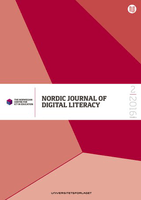
Nordic Journal of Digital Literacy
Scope & Guideline
Empowering Education in the Digital Age
Introduction
Aims and Scopes
- Digital Literacy Development:
The journal emphasizes the importance of developing digital literacy skills among students and educators, exploring various frameworks and models that enhance digital competencies. - Integration of Technology in Education:
It investigates how technology can be effectively integrated into educational settings, focusing on pedagogical strategies and the use of digital tools to enrich learning experiences. - Research on Digital Education Policies:
The journal addresses the implications of digital education policies and their impact on teaching practices and educational outcomes, analyzing political arguments and frameworks. - Impact of Digitalization on Learning Environments:
It examines how digitalization transforms learning environments, including the challenges and opportunities presented by remote learning and technology-rich classrooms. - Critical Perspectives on Digital Tools:
The journal encourages critical examinations of digital tools and practices in education, assessing their implications for equity, access, and educational effectiveness. - Interdisciplinary Approaches to Digital Competence:
It promotes interdisciplinary research that brings together insights from education, technology, psychology, and sociology to understand digital competence in diverse contexts.
Trending and Emerging
- Artificial Intelligence in Education:
Recent publications increasingly explore the role of artificial intelligence in educational contexts, examining both its potential benefits and challenges for teaching and learning. - Mental Health and Digital Learning:
There is a growing focus on the intersection of mental health and digital learning, particularly in relation to Generation Z’s experiences with social media and technology. - Innovative Pedagogical Strategies:
The journal is trending towards research on innovative teaching strategies, such as flipped classrooms and design-based research, that leverage digital tools for enhanced learning outcomes. - Critical Digital Literacy:
An emerging theme is the critical examination of digital literacy, addressing issues of equity, access, and the socio-political implications of digital practices in education. - Learning Analytics and Data-Informed Practices:
Recent themes highlight the use of learning analytics to inform educational practices, emphasizing the importance of data in understanding and improving student learning experiences.
Declining or Waning
- Traditional Educational Models:
There has been a noticeable decline in publications centered around traditional educational models, as the focus shifts towards more innovative, technology-driven pedagogies. - Basic Digital Skills Training:
As digital literacy evolves, the emphasis on basic digital skills training has diminished, with more research focusing on higher-order competencies and critical engagement with digital tools. - Single-Discipline Studies:
The journal is moving away from studies that focus solely on single disciplines, favoring interdisciplinary approaches that reflect the complex nature of digital literacy in various educational contexts. - Static Educational Policies:
Research centered on static or outdated educational policies has decreased, likely due to the dynamic nature of digital education and the need for adaptable policy frameworks. - Narrow Focus on Technology Use:
There is a waning interest in papers that only address the use of technology without considering broader educational implications, such as pedagogical strategies and learner engagement.
Similar Journals

Journal of Information Technology Education-Innovations in Practice
Empowering Educators with Cutting-Edge ResearchThe Journal of Information Technology Education-Innovations in Practice (ISSN: 2165-3151; E-ISSN: 2165-316X), published by the Informing Science Institute, serves as a vital resource for researchers and practitioners in the intersection of information technology and education. With a focus on innovative practices and pedagogical advancements, this journal aims to disseminate high-quality research that enhances teaching methodologies and learning experiences in the digital age. Having demonstrated its relevance within the academic community, it proudly holds a Q3 category ranking in both Computer Science and Education fields as of 2023, alongside commendable Scopus rankings, namely #812 out of 1543 in Social Sciences Education and #92 out of 133 in Computer Science (miscellaneous). As a platform that actively promotes open access knowledge, the journal encourages boundary-pushing inquiries while catering to the evolving needs of educators and technology specialists alike. With its convergence period spanning from 2015 to 2024, the journal is poised to play a significant role in shaping the future of IT education.

Virtualidad Educacion y Ciencia
Innovating Education: Embracing the Power of Virtual EnvironmentsVirtualidad Educacion y Ciencia is a leading open-access journal published by Univ Nacl Cordoba, Centro Estudios Avanzados, dedicated to advancing the field of educational virtuality and science. With its ISSN 1853-6530, this interdisciplinary journal has been pivotal in fostering dialogue among researchers, educators, and practitioners since its inception in 2010. The journal emphasizes the integration of technology in education, aiming to explore innovative pedagogical practices and the implications of virtual learning environments. Situated in Córdoba, Argentina, it contributes to a rich landscape of global scholarship, offering researchers and professionals an avenue to disseminate their findings widely without financial barriers. The journal's commitment to high editorial standards ensures that published articles are of high impact and relevance, making it an essential resource for anyone interested in the intersection of technology and education.
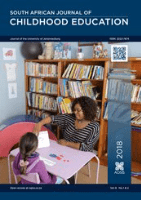
South African Journal of Childhood Education
Unlocking potential in childhood education through open access knowledge.South African Journal of Childhood Education, published by AOSIS, serves as a crucial platform for the dissemination of research focused on early childhood education and developmental psychology in South Africa and beyond. With an Open Access model initiated in 2011, it ensures that valuable insights and findings are accessible to a broad audience, fostering collaboration and innovation in educational practices. The journal's impact in the field is reflected in its rankings, placing it in Q3 and Q4 categories for Education and Developmental and Educational Psychology, respectively. It ranks at #824 out of 1543 in Social Sciences - Education and #240 out of 360 in Psychology, highlighting its relevance and academic rigor. By bridging theoretical perspectives with practical implications, the journal aims to advance understanding in childhood education, making it an essential resource for researchers, educators, and students committed to improving educational outcomes in early development.

Journal of Technical Education and Training
Cultivating Expertise in Technical Disciplines Worldwide.Journal of Technical Education and Training, published by PENERBIT UTHM, is a premier academic journal dedicated to the field of technical education and training. Since its inception in 2016 and continuing through to 2024, this journal serves as a vital platform for scholars, educators, and industry professionals to disseminate innovative research, best practices, and critical discourse aimed at enhancing educational outcomes in technical disciplines. With an ISSN of 2229-8932 and E-ISSN 2600-7932, the journal is indexed within Scopus where it holds a commendable rank of #763 out of 1543 in Social Sciences – Education, placing it in the 50th percentile. Although categorized in the Q3 quartile for 2023, the journal continues to expand its influence and readership worldwide. Based in Malaysia at Universiti Tun Hussein Onn, this open-access journal provides researchers with the opportunity to access and share knowledge without barriers, thus contributing to the ongoing development of technical education practices globally.

Ensayos-Revista de la Facultad de Educacion de Albacete
Championing accessible research for transformative education.Ensayos-Revista de la Facultad de Educacion de Albacete is a distinguished open-access journal dedicated to the field of education, published by UNIV CASTILLA-LA MANCHA, ESCUELA MAGISTERIO ALBACETE. Since its inception in 2011, the journal has provided a platform for high-quality research and innovative pedagogical practices, fostering academic discourse and collaboration among educators, researchers, and practitioners in the education sector. With an ISSN of 0214-4824 and E-ISSN 2171-9098, it is committed to disseminating knowledge that enhances educational outcomes and promotes effective teaching methodologies. The journal is located in Albacete, Spain, and emphasizes the importance of educational research in shaping contemporary educational frameworks. By ensuring open access to its content, Ensayos makes its research widely available, allowing for greater impact and engagement within the academic community. This commitment to accessibility positions the journal as a valuable resource for anyone invested in the advancement of education.
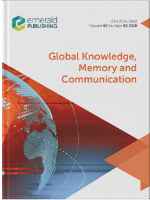
Global Knowledge Memory and Communication
Innovating Connections in Global Knowledge ManagementGlobal Knowledge Memory and Communication, published by EMERALD GROUP PUBLISHING LTD, is a leading journal in the field of Library and Information Sciences, with an impressive 2023 Q2 ranking in its category. With an ISSN of 2514-9342 and an E-ISSN of 2514-9350, this journal has been at the forefront of research since its inception in 2018 and is expected to run until 2024, showcasing significant contributions to the nexus of knowledge management and communication practices. Based in the United Kingdom, the journal's editorial scope encompasses diverse perspectives on how knowledge is created, shared, and retained in an increasingly digital world, making it a vital resource for researchers, academics, and practitioners in the social sciences. Furthermore, with its current Scopus ranking of #58 out of 280 in the library and information sciences category, which positions it in the top 79th percentile, the journal engages a global audience committed to advancing knowledge across disciplines. Though it is not an open-access journal, its rich and diverse content ensures it remains accessible to a wide readership, enabling meaningful discourse and innovation in the field.
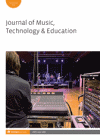
Journal of Music Technology & Education
Transforming education through the power of music technology.Welcome to the Journal of Music Technology & Education, a leading academic journal dedicated to the intersection of music, technology, and pedagogical practices. Published by INTELLECT LTD in the United Kingdom, this journal has gained considerable recognition within the scholarly community, particularly noted for its strong rankings across multiple disciplines. As of 2023, it holds a prestigious Q1 quartile position in Music, Q2 in Education, and Q3 in Computer Science Applications, highlighting its multifaceted impact on various fields. Spanning over a decade from 2012 to 2023, the journal features rigorous peer-reviewed articles that explore innovative approaches to music education, technology integration in teaching practices, and advancements in digital music creation. Researchers, educators, and students alike will find valuable insights and cutting-edge research to keep them at the forefront of this rapidly evolving landscape. Access to the journal's content is available to a broad audience, making it a vital resource for anyone interested in the vibrant world of music technology.

E-Learning and Digital Media
Fostering collaboration between education and technology.E-Learning and Digital Media, published by SAGE Publications Inc, is a premier academic journal dedicated to the innovative intersection of digital technologies and education. With a strong commitment to advancing research in the fields of education and computer science, this journal has established itself as a vital resource for researchers, professionals, and students alike. As of 2023, it proudly holds a Q2 ranking in both Computer Science Applications and Education, reflecting its impact and reach within the academic community. The journal encompasses a wide range of topics exploring the effectiveness and applications of e-learning technologies, pedagogical strategies, and digital media in educational settings. Since its inception in 2009, E-Learning and Digital Media has continuously contributed to the understanding and development of digital education, ensuring relevancy in an ever-evolving landscape. With an open access model intended to foster accessibility and dissemination of knowledge, this journal invites submissions that push the boundaries of traditional education through cutting-edge research and practice.
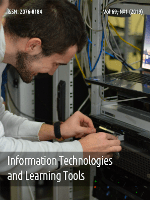
Information Technologies and Learning Tools
Leading the Charge in Digital Learning Innovations.Information Technologies and Learning Tools is a pioneering scholarly journal dedicated to the exploration and dissemination of knowledge within the rapidly evolving field of educational technology. Published by the NATIONAL ACADEMY OF EDUCATIONAL SCIENCES OF UKRAINE, INSTITUTE OF DIGITALIZATION EDUCATION, this journal has maintained its Open Access policy since 2006, ensuring that groundbreaking research is readily available to educators, researchers, and practitioners worldwide. With the ISSN 2076-8184, the journal serves as a critical platform for innovative studies focusing on the integration of information technologies into educational practices, seeking to bridge gaps between digital tools and effective learning methodologies. Despite the absence of specific rankings, its commitment to advancing educational theories and applications positions it as an essential resource for professionals and students striving to enhance learning experiences through technology. As the educational landscape continues to transform, Information Technologies and Learning Tools stands at the forefront, fostering collaboration and knowledge sharing across diverse academic communities.

Technology Pedagogy and Education
Elevating Educational Standards through Technology IntegrationTechnology Pedagogy and Education, published by Routledge Journals, Taylor & Francis Ltd, is a leading academic journal focused on the intersection of technology and educational practices. With an impact factor reflecting its significant contribution to the field, this journal provides a critical platform for disseminating innovative research and emerging trends in technology-enhanced learning. Serving as a resourceful hub since its inception in 2003, it has established itself in the top quartile of various categories, including Communication, Computer Science Applications, Education, and Information Systems. Researchers and educators alike will find the journal's insights invaluable as they navigate the ever-evolving landscape of educational technology. Although it does not currently offer open access options, its rigorous peer-review process ensures that only the highest quality research is published, making it essential reading for anyone invested in the educational sector.